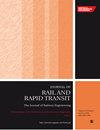Hunting motion of high-speed emu during cross-line operation: Mechanism and countermeasures
IF 1.7
4区 工程技术
Q3 ENGINEERING, CIVIL
Proceedings of the Institution of Mechanical Engineers Part F-Journal of Rail and Rapid Transit
Pub Date : 2023-08-25
DOI:10.1177/09544097231195917
引用次数: 0
Abstract
During the operation of the Chinese 250 km/h-level EMU, hunting occurs when the EMU crosses from Line B to Line A. Numerous tests and simulations have been conducted to investigate the mechanism of this phenomenon. Comparisons of the measured rail profiles of the two lines indicate that the left rail in Line A is higher than that in Line B at the inner rail shoulder. In addition, the top position of the right rail in Line A is approximately 2–3 mm closer to the inside than that of the right rail in Line B, with the right rail in Line A being higher than that in Line B at the inner rail shoulder. These differences cause a significant increase in the wheel–rail equivalent conicity when the EMU crosses from Line B to Line A and further cause the hunting phenomenon. Moreover, simulations and experiments are conducted to investigate the countermeasures for EMU cross-line hunting. Field test results show that both increasing the damping of the yaw damper and wheel reprofiling can improve the stability during EMU cross-line operation; however, the effect of increasing the damping of the yaw damper is limited under particularly poor wheel–rail relationship. Simulation results reveal that rail grinding of Line A referring to the Chinese 60N rail profile can also improve the stability of the EMU during cross-line operation.高速动车组在跨线运行中的狩猎运动:机理与对策
在中国250公里/小时的动车组运行期间,动车组从B线到a线时发生了猎捕现象,已经进行了大量的测试和模拟来研究这种现象的机制。对比两条线路的实测钢轨轮廓,A线左侧钢轨内轨肩处比B线左侧钢轨高。此外,A线右侧轨顶位置比B线右侧轨顶位置向内侧偏近约2 ~ 3mm,且A线右侧轨内肩处比B线右侧轨高。这些差异导致动车组从B线穿越到a线时轮轨等效锥度显著增大,进一步造成了“猎车”现象。此外,还通过仿真和实验研究了动车组跨线猎捕的对策。现场试验结果表明,增加横摆阻尼器的阻尼和车轮改型都能提高动车组跨线运行时的稳定性;然而,在轮轨关系特别差的情况下,偏航阻尼器增加阻尼的效果有限。仿真结果表明,参照中国60N钢轨轮廓线对A线钢轨进行磨轨也能提高动车组跨线运行时的稳定性。
本文章由计算机程序翻译,如有差异,请以英文原文为准。
求助全文
约1分钟内获得全文
求助全文
来源期刊

CiteScore
4.80
自引率
10.00%
发文量
91
审稿时长
7 months
期刊介绍:
The Journal of Rail and Rapid Transit is devoted to engineering in its widest interpretation applicable to rail and rapid transit. The Journal aims to promote sharing of technical knowledge, ideas and experience between engineers and researchers working in the railway field.
 求助内容:
求助内容: 应助结果提醒方式:
应助结果提醒方式:


